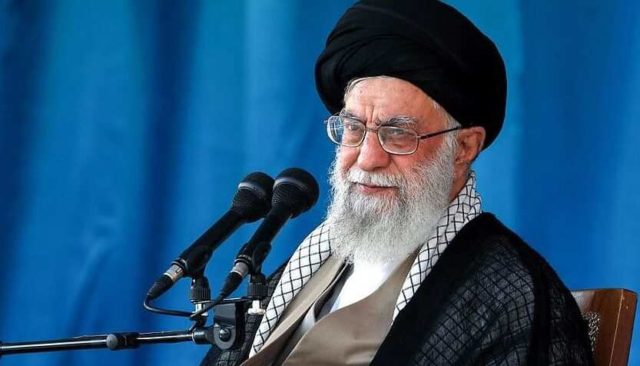
Khamenei claims Iran wants nuclear energy, not weapons, as talks progress Ayatollah Ali Khamenei. (Ali Khamenei/Released)
This article was originally published by Radio Free Europe/Radio Liberty and is reprinted with permission.
Iran’s supreme leader, Ayatollah Ali Khamenei, has said Tehran needs nuclear energy, not weapons, amid signs of a breakthrough in long-running negotiations to revive a landmark atomic deal with world powers.
In comments aired by state television on February 17, the hard-line Khamenei, who holds ultimate religious and political authority in Iran, said Tehran “has to think about tomorrow” and that “sooner or later we will urgently need peaceful nuclear energy.”
Talks have been taking place in Vienna to revive the 2015 nuclear deal, known as the Joint Comprehensive Plan of Action (JCPOA), which came about because countries were worried Tehran was not being truthful about the aims of its nuclear program.
Direct talks with Iran involve negotiators from Britain, China, France, Germany, and Russia. The United States is taking part indirectly, since Iran has refused to meet face-to-face with the U.S. delegation.
Iran was targeted by increasingly tough sanctions by the United Nations, as well as the United States and other countries, before the deal with major world powers to curb Tehran’s sensitive nuclear activities in exchange for sanctions relief in 2015.
Then-President Donald trump pulled the United States from that deal in 2018 and reimposed stringent sanctions that battered Iran’s economy and its currency.
Western diplomats said earlier this week that the talks to revive the JCPOA were in the final phase and they believe that a deal is within reach.
“We have reached a tipping point now. It’s not a matter of weeks; it’s a matter of days,” French Foreign Minister Jean-Yves Le Drian told parliament on February 16.
“Political decisions are needed from the Iranians. Either they trigger a serious crisis in the coming days, or they accept the agreement that respects the interests of all parties.”
Iran’s lead negotiator, Ali Bagheri Kani, responded on Twitter, calling on Western powers “to be realistic, avoid intransigence, and heed lessons of past 4yrs. Time for their serious decisions.”
“After weeks of intensive talks, we are closer than ever to an agreement; nothing is agreed until everything is agreed, though,” Kani said.
U.S. State Department spokesman Ned Price said the United States was in “the midst of the very final stages” of indirect talks with Iran aimed at salvaging the deal.
“This is really the decisive period during which we’ll be able to determine whether a mutual return to compliance with the JCPOA is in the offing, or if it’s not,” Price said, using the acronym for the Joint Comprehensive Plan of Action.
Iranian Foreign Minister Hossein Amir-Abdollahian said on February 14 that an agreement to restore the deal was “at hand” and told a news conference in Tehran that Iran was “serious and ready to reach a good agreement.”




